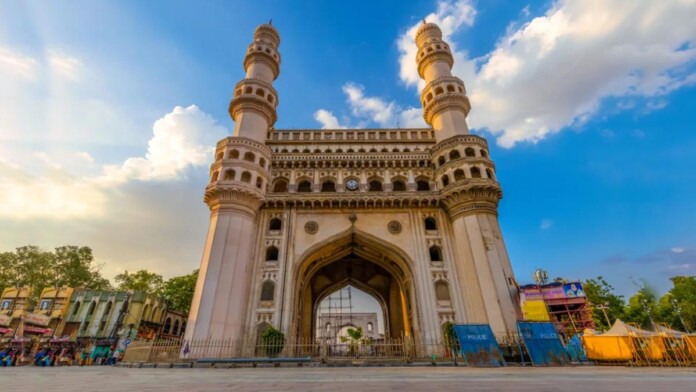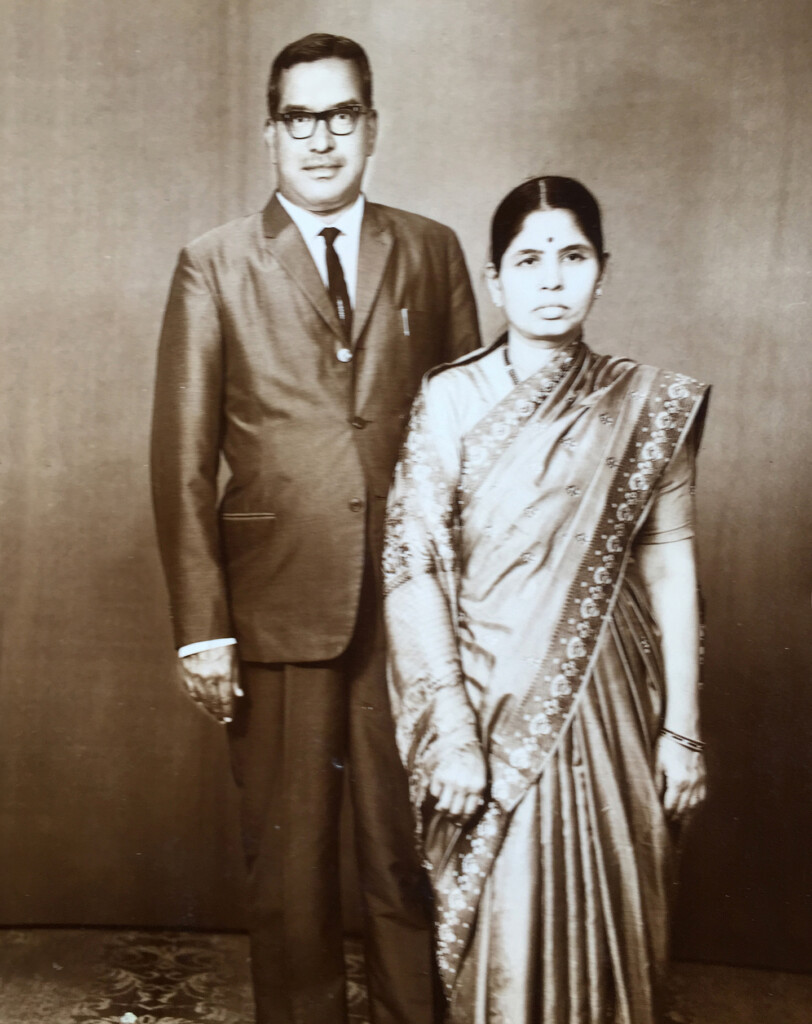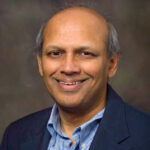Ram shares his sustainable childhood memories of his early life in Hyderabad. He reminisces about India’s rich cultural lore, sustainable practices, and a wisdom-filled heritage. He asks why we should reflect and follow them if we want to save ourselves from the impending climate crisis.
I grew up in Hyderabad, India, where our house was nestled amidst nature’s embrace. Every house in my neighborhood had lush green trees, and the playground next to my home was a place where we played soccer. Sadly, today almost all houses and trees are gone, multistoried concrete buildings have taken their place. I was the youngest of six children, and our humble home was a haven for recycling and reusing. Nothing went to waste in our household. Orange peels were transformed into delicious pickles, and the seeds of mango, papaya, and grape were thoughtfully given to farmers to sow. Even plastic bags found new life; my mother skillfully wove them into delightful mats. I wore only recycled clothes handed down from my brothers and altered by Mom on a Singer sewing machine with a foot pedal.
Our family cow was not just a pet; it provided us with fresh milk, and its dung kept pests at bay. Once a week, we massaged our scalp with coconut oil and washed off with herbal nuts during our shower. My sister rejuvenated her face with turmeric. My mother fasted on the eleventh day of the moon cycle as the practice was good for one’s health. Later, I discovered that on the eleventh day of the moon cycle, the atmospheric pressure is lowest, hence considered favorable for cleansing and removing toxins from the body. See link
http://uditarora25.blogspot.com/2016/02/scientific-importance-of-fasting-on.html
Encouraging people to fast once a week could help reduce hunger, decrease food costs, and improve health outcomes. My Mom studied till her third grade, but she was wise, knew the secrets to good health, and was self-educated, even learning elementary English to communicate with her foreign born grandchildren.
My father was a renowned horticulturist with a passion for promoting the cultivation of fruits and vegetables. He shared his skills on radio and TV, spreading knowledge on growing food sustainably. In his spare time, he took on an extraordinary project: developing a seedless custard apple through natural means. His innovation earned him a Doctoral degree from the USA, including a dedicated chapter that spoke about his work with plants in my sixth-grade regional language (Telugu) textbook.
As Mom was a homemaker, Dad worked two jobs. He worked for the Ministry of Agriculture and consulted farmers. He left home at 6 AM and finished his day by 8 PM, mostly 6 days a week. Two of the farmers on whose farms he consulted and developed new and high yielding variety of grapes by natural methods won the “Padma Shree” one of India’s highest civilian awards. He published four books and 200 papers related to his field trips, experiments, and observations. Thousands of farmers were benefitted by his bulletins and knowledge. He once told me that the world was pursuing a wrong path by extracting oil from the bowels of the earth. His simple reasoning was that the plates of the earth needed this oil for their own lubrication, similar to the joints in a human body. He added that such practices could contribute to earth tremors and quakes. I never understood the import of his statement until evidence came forth on the relationship between fracking and earth tremors.
After retiring, Dad established a full-fledged nursery at the Hyderabad Public Gardens, worked full time pro bono till his last breath, all proceeds from the sale of plants was donated to the nursery, we learned about it after his passing. He was humble and never once spoke about his awards or accomplishments.
Dad’s love for plants was very strong; the two rose plants he tended to died three days after he passed away in a car crash. Coincidentally, his car crashed against a sacred fig tree, and he died on the spot; the tree fulfilled his wish as he never wanted to enter a hospital. He was cremated in an electric crematorium as he did not wish to burn a single piece of wood. Dad reminded me of Luther Burbank, one of the world’s greatest horticulturist.
Mom was an extraordinary cook, winning prizes in national culinary contests. She worked magic in the kitchen, creating delicious dishes from what others might discard – grated potato skin turned into a culinary delight. Later, I read that potato skin was rich in fiber. Nothing escaped Mom’s resourceful gaze; she watered our garden with well water and bartered our garden fruits to add more variety to our meals. She knew the importance of eating together as a family; cross-legged, we ate breakfast, lunch, or dinner. She would tell us that it was good to keep our limbs supple, a sustainable practice that prevented arthritis in my grandparents’ and parents’ generation. My grandfather would place a single jasmine flower on each of his eye and cover it with his handkerchief and take a power nap – a practice recommended in Ayurveda.
Mom was very devotional; read spiritual books, every morning she worshipped the sun for its light, the holy basil plant for its medical benefits, and deities, she saw her worship as a bridge to the divine – similar to objects, symbols, and images practiced by all faiths. She sang beautiful hymns during the process. In ancient India, conservation of environment and ecology was an integral part of human living as evidenced in the centuries old book, Arthashastra (a strategic work on how a King needs to govern) written by Kautilya. See link
chrome://external-file/Environmental-conservation-in-Kautilya-Arthasastra-1.pdf
Festivals were a time of joy and celebration in our home. Jasmine and hibiscus garlands adorned the house, and we would rise early to celebrate Diwali and welcome the dawn with incense and firecrackers. Mom and Dad’s traditions were deeply rooted in sustainability and reverence for nature. When they had their first grandchild, the crib was made from a used sari running through a hook on the ceiling. Torn saris were used to mop the floor, and coconut husk was used to clean pots and pans. We never used any chemicals. Life was simple, fun, and sustainable. One of India’s greatest saint and spiritual leader of our time, Paramahansa Yogananda once said, “Be calmly active, and actively calm.” My parents met this description.
After graduation and marriage, life took me to distant shores. We hopped from state to state and from house to house, acquiring more possessions and discarding some in the process. However, amidst the rat race and material complexity, I yearned for the simplicity of my childhood home. I realized my parents’ wisdom held the key to happiness – less meant more to them. But in the world, I now live in, more means less; our transition to a consumerist society has been swift and unprecedented.
Our global culture clashes with the sustainable values most of us grew up with. The depletion of Mother Earth’s biodiversity and resources saddens us. The seers of India preached that true happiness lay in overcoming desires, not satisfying every sense desire as the world does today. Moderation, balance, service to humanity, respect for all life including plants and animals, least harm to the five basic elements of nature (water, soil, air, energy, and space) were the hallmarks of the culture of India. In ancient India, culture shaped the economy. Today, globally, economy shapes our culture – dependence on fossil fuels, plastics, and little regard by any sector of industry to protect the five basic elements of nature. Fossil fuel industry leads the pack with relative impunity. Renewables and green tech need to leverage the numerous metal free innovations instead of mining minerals and metals from the earth, moon, or the ocean floor; process will emit more greenhouse gases and is already proving to be hazardous to ecosystems. See link
https://phys.org/news/2023-07-ocean-animals-vacate-areas-deep-sea.html
Ancient India and our ancestors have bequeathed to us a rich cultural lore, sustainable practices, and a wisdom-filled heritage – we need to revive their wisdom if we want to save ourselves from the vagaries of climate change.
Ram Ramprasad is a sustainability advocate. He authored two books and contributed articles to magazines in India including Earth.org. He holds graduate degrees from Yale University, USA, and Madras University, India. He worked as a Global Marketing Director for a Fortune 100 company in the USA.












